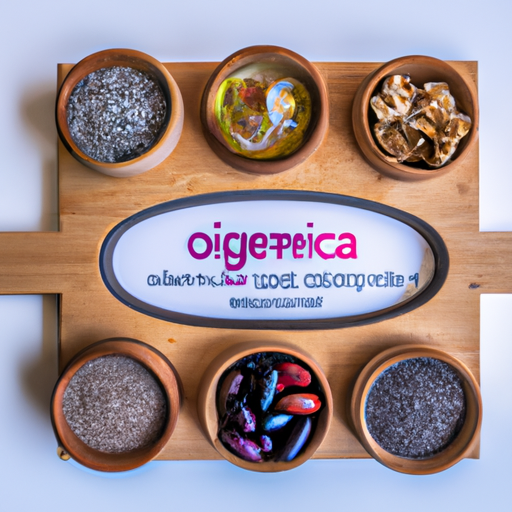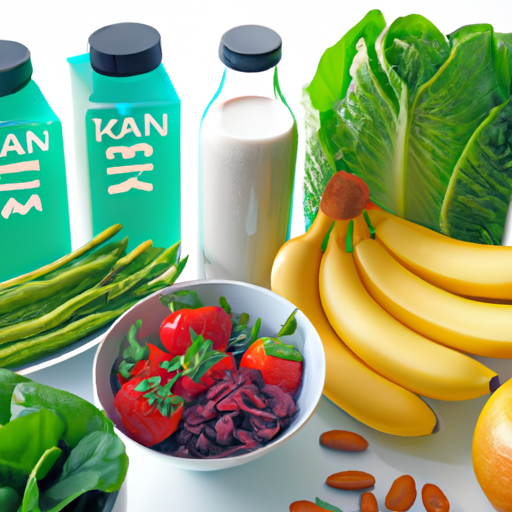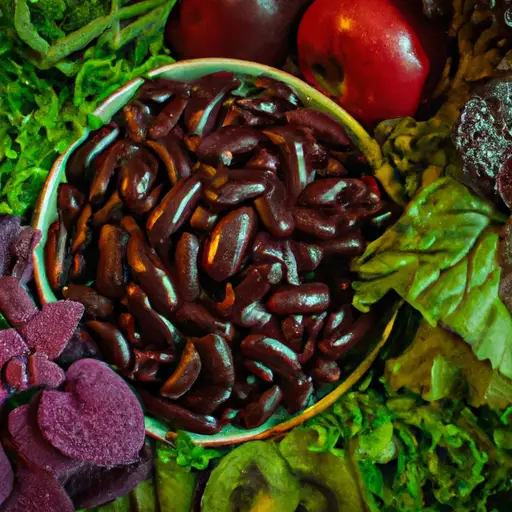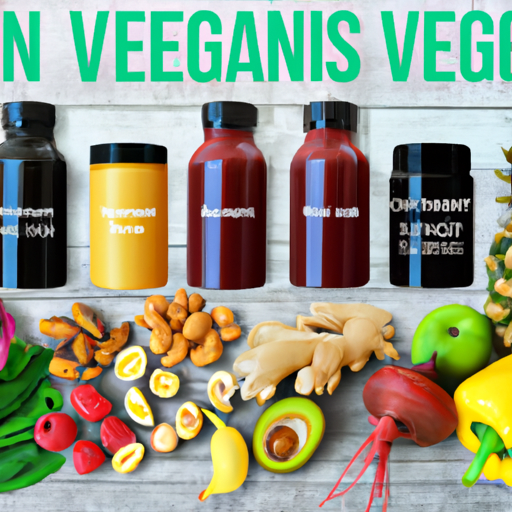Looking to maintain a healthy vegan lifestyle? Look no further! Just like the elusive fountain of youth, the best vegan vitamins and supplements can help you achieve optimal health and well-being. By incorporating these essential nutrients into your diet, you can ensure that your body gets all the necessary vitamins and minerals that may be lacking in a plant-based diet. From vitamin B12 supplements for energy and brain function, to omega-3 fatty acid sources for a healthy heart, there are a variety of options available to suit your needs. Don’t forget about multivitamins, iron, and calcium supplements, which can provide a well-rounded approach to your vegan nutrition. So, let’s dive in and discover the best vegan vitamins and supplements for a vibrant and thriving lifestyle!
Key Takeaways
- Vitamin B12 supplements are crucial for vegans to prevent deficiencies and support healthy brain function.
- Plant-based sources of Omega-3 fatty acids, such as flaxseeds, chia seeds, and walnuts, are important for heart and brain health.
- Multivitamins can bridge nutrient gaps in a vegan diet, providing essential vitamins and minerals, including protein, calcium, vitamin B12, vitamin D, iodine, zinc, and omega-3 fatty acids.
- Iron and calcium supplements may be necessary for vegans who struggle to meet their needs from food alone, while also ensuring adequate intake of protein and considering vitamin D supplementation.
Vitamin B12 Supplements

To ensure you meet your vitamin B12 needs on a vegan diet, consider incorporating B12 supplements into your daily routine. While a vegan diet can be rich in many nutrients, it is important to address potential nutrient deficiencies, and vitamin B12 is one of them. Vitamin B12 is primarily found in animal-based foods, making it difficult for vegans to obtain enough of this essential nutrient solely through their diet.
A deficiency in vitamin B12 can lead to various health issues such as fatigue, weakness, and even neurological problems. By taking B12 supplements, you can mitigate the risk of developing these deficiencies and maintain optimal health on a vegan diet.
Vitamin B12 supplementation offers several benefits for those following a vegan lifestyle. Firstly, it ensures you are meeting your daily recommended intake of B12, which is crucial for the production of red blood cells and the functioning of your nervous system. Additionally, it supports healthy brain function and can improve energy levels. By incorporating B12 supplements into your routine, you can safeguard against potential deficiencies and enjoy the benefits of optimal B12 levels.
Omega-3 Fatty Acid Sources

For optimal intake of omega-3 fatty acids on a vegan diet, it is important to include reliable plant-based sources in your daily meals. Omega-3 fatty acids are essential fats that play a crucial role in maintaining heart and brain health, reducing inflammation, and promoting overall well-being. While fish oil is a common source of omega-3s, vegans can find plant-based alternatives that offer similar health benefits. Here are four reliable sources of omega-3 fatty acids for vegans:
-
Flaxseeds: These tiny seeds are packed with alpha-linolenic acid (ALA), a type of omega-3 fatty acid. Ground flaxseeds can easily be added to smoothies, oatmeal, or baked goods for a boost of omega-3s.
-
Chia seeds: Like flaxseeds, chia seeds are rich in ALA. They can be soaked in water or plant-based milk to create a gel-like consistency, making them a great addition to puddings, yogurts, or overnight oats.
-
Walnuts: A handful of walnuts provides a good amount of ALA. They can be enjoyed as a snack or added to salads, stir-fries, or baked goods for a crunchy and nutritious boost.
-
Algal oil: Derived from algae, this oil is an excellent source of docosahexaenoic acid (DHA) and eicosapentaenoic acid (EPA), the two main types of omega-3 fatty acids found in fish. Algal oil supplements are available for those who prefer a convenient option.
Multivitamins for Vegans

For optimal nutrition on a vegan diet, it is essential to include multivitamins to ensure you are meeting all your dietary needs. While a well-planned vegan diet can provide most of the nutrients your body requires, there are certain vitamins and minerals that may be more challenging to obtain solely from vegan food sources. Multivitamins can help bridge these nutrient gaps and support overall health.
One nutrient that may be a concern for vegans is protein. While there are plenty of vegan protein sources like legumes, tofu, tempeh, and quinoa, some individuals may have higher protein needs or struggle to consume enough protein-rich foods. In such cases, a multivitamin can provide additional protein to meet their requirements.
Another nutrient of concern for vegans is calcium. While dairy products are the most common source of calcium in a non-vegan diet, there are several plant-based calcium alternatives that can be included in a vegan diet. Foods like kale, broccoli, almonds, and fortified plant-based milks are excellent sources of calcium. However, if you are unable to meet your calcium needs solely through these sources, a multivitamin can provide the necessary calcium supplementation.
In addition to protein and calcium, multivitamins can also provide a range of other essential vitamins and minerals that may be lacking in a vegan diet. These may include vitamin B12, vitamin D, iodine, zinc, and omega-3 fatty acids.
Now, let’s move on to the next section about iron and calcium supplements, which are two additional nutrients that vegans need to pay attention to.
Iron and Calcium Supplements

Are you wondering how to ensure you meet your iron and calcium needs on a vegan diet? While it is possible to obtain these essential nutrients from plant-based sources, some vegans may find it challenging to meet their requirements solely through food. In such cases, supplementing with iron and calcium can be beneficial. Here are some options to consider:
-
Iron supplements: Iron is crucial for the production of red blood cells and oxygen transportation in the body. Look for supplements that contain ferrous sulfate or ferrous gluconate, as these forms are more easily absorbed. It is also recommended to take iron supplements with vitamin C to enhance absorption.
-
Calcium supplements: Calcium is essential for strong bones and teeth, as well as proper muscle and nerve function. Choose supplements that contain calcium carbonate or calcium citrate, which are well-absorbed by the body. It is important to note that calcium absorption is aided by vitamin D, so consider taking a vitamin D supplement to maximize calcium uptake.
-
Protein sources: While iron and calcium are important, don’t forget about protein. Plant-based protein sources like tofu, tempeh, legumes, and quinoa can help meet your daily protein needs. Incorporating a variety of these foods into your diet can ensure you get all the essential amino acids.
-
Vitamin D supplements: Since vitamin D is primarily obtained through sunlight exposure, it can be challenging for vegans to obtain adequate amounts. Consider taking a vitamin D supplement, especially if you live in a location with limited sunlight or have limited sun exposure.
Frequently Asked Questions
Can I Get Enough Vitamin B12 From Plant-Based Sources Alone?
You can’t get enough vitamin B12 from plant-based sources alone. Vegans are at risk of vitamin B12 deficiency, which can lead to serious health problems. Supplementation is important for vegans to maintain optimal health.
Are There Any Vegan Sources of Omega-3 Fatty Acids Other Than Flaxseeds and Chia Seeds?
Are there vegan sources of omega-3 fatty acids other than flaxseeds and chia seeds? Absolutely! You can try walnuts, hemp seeds, seaweed, and algae-based supplements. As for vegan options for vitamin D, fortified plant milks and mushrooms are great choices.
What Are the Key Nutrients That Should Be Included in a Vegan Multivitamin?
When choosing a vegan multivitamin, it’s important to look for key nutrients like vitamin B12, omega-3 fatty acids from plant-based sources, iron sources that meet your needs, and easily absorbed plant-based calcium.
Can I Meet My Iron Needs Through Plant-Based Foods Alone, or Do I Need to Take an Iron Supplement?
You may be able to meet your iron needs through plant-based foods alone, but it can be challenging. An iron supplement could help ensure you’re getting enough. For example, a vegan athlete might benefit from an iron supplement to support their increased iron requirements.
Are There Any Plant-Based Sources of Calcium That Are More Easily Absorbed by the Body Than Others?
To optimize calcium absorption in a vegan diet, focus on easily absorbed calcium sources. Calcium-rich plant foods like kale, broccoli, and tofu can help meet your needs. Consider calcium supplements if necessary for strong bones and optimal health.
Conclusion
In conclusion, incorporating vegan vitamins and supplements into your lifestyle can provide essential nutrients that may be lacking in a plant-based diet. Vitamin B12 supplements can support energy production and nerve function, while omega-3 fatty acids from sources like flaxseeds and walnuts can promote heart health. Multivitamins tailored for vegans ensure a well-rounded nutrient intake, and iron and calcium supplements help meet the body’s requirements. By prioritizing these supplements, you can maintain a healthy and balanced vegan lifestyle.


Leave a Reply